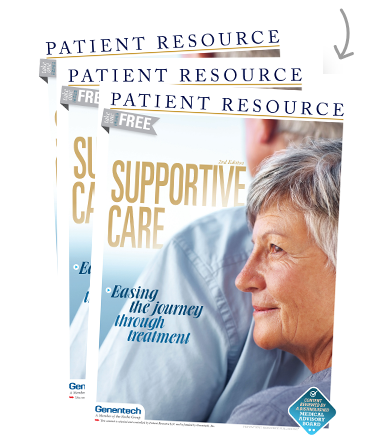Cytokine Release Syndrome
Cytokine release syndrome (CRS) can occur if immune cells affected by treatment rapidly release large amounts of cytokines into the bloodstream. This process can send the immune system into overdrive, leading to CRS.
A cytokine is a type of protein that is made by certain immune and non-immune cells, and it is a part of a healthy immune system. These small proteins help control the growth and activity of your blood cells and immune cells. Some cytokines stimulate the immune system and others slow it down. Cytokines tell your immune system to do its job. But, when too many cytokines are released, it can result in a cytokine storm, which can lead to high fever, inflammation, fatigue and nausea that can be severe or life-threatening and damage multiple organs.
When is CRS likely to occur?
CRS can happen from a few hours to some weeks after treatment with certain forms of immunotherapy, including bispecific T-cell engagers (BiTEs), chimeric antigen receptor (CAR) T-cell therapies or monoclonal antibodies (mAbs). It can also occur as a response to infection.
Some cases are mild but can become serious, causing inflammation throughout the body and problems with many organs. Without swift medical treatment, CRS can be fatal.
How CRS is managed
CRS must be treated by your health care provider. Some people who are treated with immunotherapy are at higher risk for CRS if they also have certain conditions or comorbidities.
Before treatment begins, if possible, inform your medical team if any of the following apply to you and ask whether they increase your risk of CRS:
- Age 65 and over
- Living in a group home or nursing care facility
- Diagnosed with any type of diabetes
- Living with heart disease
- Underlying health conditions that affect the immune system
- Obesity
When should you call your health care provider?
Following are symptoms of CRS that you can recognize and monitor at home; however, when they occur after you have been treated with a therapy that has the potential for CRS, you must consider them very serious and contact your health care provider right away. Common symptoms include:
- Persistent fever of 100.4 °F or more (or as indicated by your healthcare provider)
- Chills
- Nausea
- Fatigue and weakness
- Headache
- Rash
- Muscle aches and pain
- Fast or irregular heartbeat
- Difficulty breathing
- Confusion
- Dizziness
- Seizures
In addition, it is extremely important to stay on a strict schedule with your medical appointments to ensure your health care provider can monitor you for signs that you are unable to see on your own, such as the following:
- Low blood pressure
- High heart rate
- High respiratory rate
- Possible organ damage
- Abnormal liver and kidney test results
- Changes in blood clotting
If you show signs of CRS, your health care provider may give you fever-reducers and/or medications to lower the immune response caused by treatment, adjust or stop your dosage, or give you intravenous fluids, oxygen or medications to manage your blood pressure and heart function. You may have to be admitted to the hospital for treatment and monitoring.



